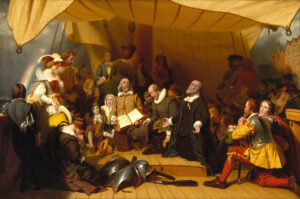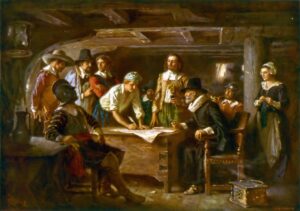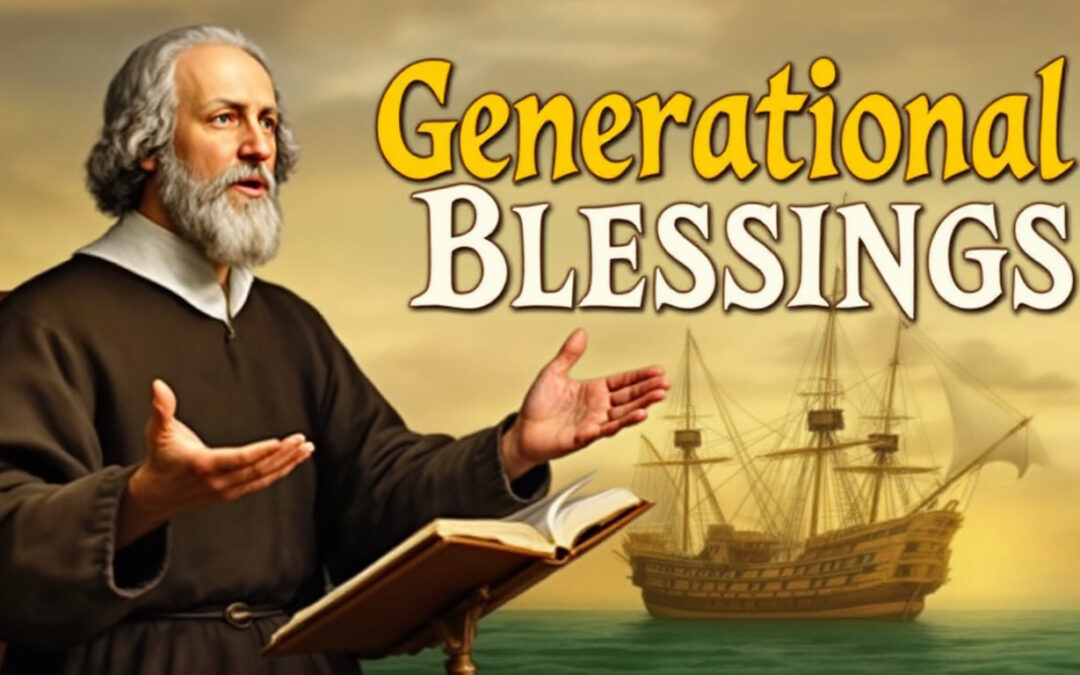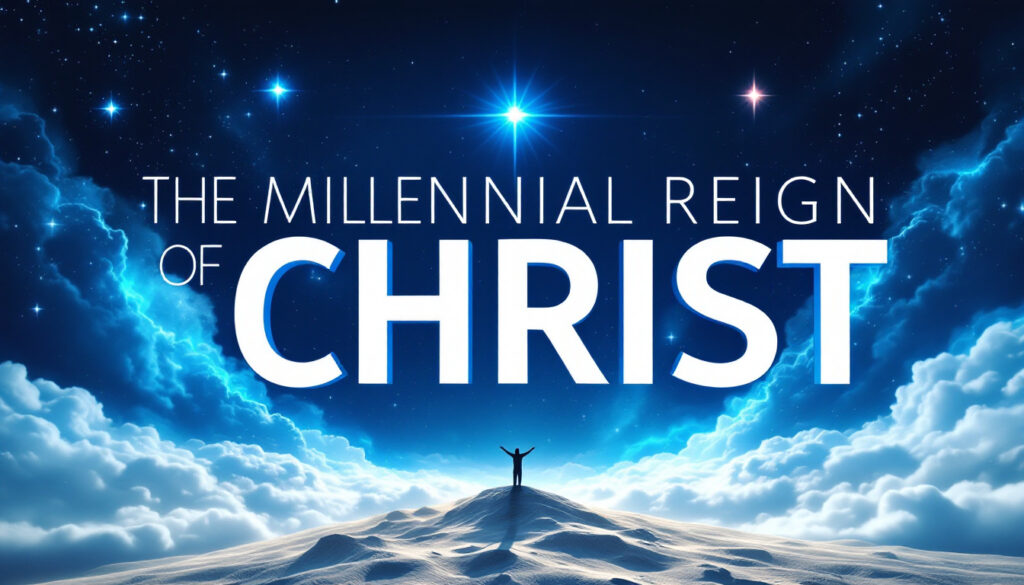William Brewster: His Ancestry, Persecution by King James, Hopes for the New World, and the Bible’s Promises for His Descendants
What does it really mean to be shaped by legacy—by a man who sailed into the unknown because his faith would not let him sit still? William Brewster wasn’t just a Mayflower passenger. He carried his family’s hopes, and a whole movement’s vision, straight into history. For me, this isn’t just a story about the past. It’s about roots, risk, and what he handed down—because he is my 12th great-grandfather.

Why did William Brewster leave everything for a wild continent across the sea? It wasn’t for gold or fame. He was hunted by King James—yes, the same king who “authorized” the KJV Bible—because William Brewster believed ordinary people should read and hear Scripture for themselves. He wanted a land where he could preach, pray, and raise his family without fear. We’ll look at the old records, the sermons he actually delivered (yes, some survived), and those fierce hopes for a new world.
 Let’s get real about William Brewster—the man often described as the unofficial pastor aboard the Mayflower. You picture sermons as long, wordy affairs, right? Here’s the twist: There’s no official “Sermon Collection” from William Brewster’s time on that ship. No YouTube playlist or dusty manuscript. That’s shocking if you expected stacks of text, but it’s honest history.
Let’s get real about William Brewster—the man often described as the unofficial pastor aboard the Mayflower. You picture sermons as long, wordy affairs, right? Here’s the twist: There’s no official “Sermon Collection” from William Brewster’s time on that ship. No YouTube playlist or dusty manuscript. That’s shocking if you expected stacks of text, but it’s honest history.
William Brewster led, taught, and encouraged the Pilgrims, mostly through talks, prayers, and old-school readings from the Geneva Bible—he didn’t leave behind sermons in the way people think of today, with titles and transcripts. Instead, what we know comes from folks who sailed or settled with him, like William Bradford (whose journal, Of Plymouth Plantation, reads like a community blog with family drama).
William Brewster’s preaching focused on real-life needs: hope in the face of cold and hunger, correction when tempers blew up, unity when disagreements got loud. He grounded his lessons in the basics—God’s faithfulness, the point of covenant (that’s a deep promise, like marriage vows, but between people and God), and the push to love each other, especially when everyone wanted to quit.
While no one can point you to a scanned PDF of his “Thanksgiving Day Homily,” here’s where you can dig deeper: the Pilgrim Hall Museum (pilgrimhall.org) offers a timeline and context; Plimoth Patuxet Museums keep his story alive in real time (plimoth.org); for classic sources, check out Bradford’s Of Plymouth Plantation (gutenberg.org/ebooks/24950) for mentions of William Brewster’s teaching style—which he described as gentle, steady, not flashy.
Scholars have pieced together that William Brewster’s style leaned practical: he read Scripture, explained it in plain speech, and invited honest questions. No yelling, no showmanship. Just steady encouragement—as if he was saying, “We’ll get through this mess together, one prayer at a time.”
 If you’re hungry for more, historian Jeremy Bangs wrote Strangers and Pilgrims, Travellers and Sojourners, which unpacks William Brewster as a preacher on both sides of the Atlantic. Nobody’s got a playlist of his sermons, but if you look in the right places, you’ll see the trace of his words—a steadying force in wild times. Want to keep digging? Follow the links and see how ordinary words, spoken with heart, kept a battered community afloat.
If you’re hungry for more, historian Jeremy Bangs wrote Strangers and Pilgrims, Travellers and Sojourners, which unpacks William Brewster as a preacher on both sides of the Atlantic. Nobody’s got a playlist of his sermons, but if you look in the right places, you’ll see the trace of his words—a steadying force in wild times. Want to keep digging? Follow the links and see how ordinary words, spoken with heart, kept a battered community afloat.
The pull of ancestry is strong. The Bible speaks again and again about blessings handed down through generations—often promised in moments of great faith or risky obedience. What kind of inheritance does that leave for us? Can we really claim those old blessings, or finish the tasks our ancestors began? Let’s walk into William Brewster’s boots for a moment and see what’s still unfinished, what’s left for us, and what God says about the ripple effects of faith across centuries.
Ancestry and Early Life of William Brewster
Picture William Brewster as a boy running the muddy lanes of Scrooby, Nottinghamshire—a village small enough for everyone to know your secrets but lively with whispers of change. His roots held fast in the church, manor, and fields, but the world was on the edge of something big. William Brewster’s family, surrounded by religious shifts and power games, set the stage for a faith that would not bend. Both his bloodline and upbringing shaped his courage to stand up to the most powerful men in England.
Family Origins in Scrooby and Beyond
The Brewsters were not just another family plowing the fields. William’s father, also named William Brewster, was the bailiff and managing agent for the Archbishop of York’s manor at Scrooby. If you’ve ever wondered what it’s like to be both respectable and a little bit risky—think of the Brewsters. As stewards of the Manor House, their social standing gave young William access to ideas, books, and visitors few rural kids got.
What did that look like?
- Social status: One step below the true gentry, above most farmers. Trusted with estate business, but not immune to hardship if the political winds changed.
- Religious life: Regular worship at St. Wilfrid’s Church, where Scripture reading wasn’t just allowed—it was expected for men of their rank. Here, young William Brewster heard both the pageantry of the official church and rumblings of “godly reformers.”
- Family ties: The Brewsters seem to have descended from earlier Yorkshire gentry. Genealogists have dug into parish records and court rolls, tracing the name back to the 1400s, though no one claims royal blood. Family traditions spoke of service, not nobility.
- Influential visitors: Scrooby Manor sat on the Great North Road—think of it like the interstate of its time—meaning William Brewster saw pilgrims, travelers, and maybe even churchmen dodging royal spies.
Historians believe this blend of duty, witness, and quietly radical talk at home set young William on a path most of his neighbors wouldn’t dare try. For more about the wider context of the Brewster family’s England, you can dig into trusted resources like the Mayflower History account of William Brewster’s background.
Education and Early Influences
William’s journey from quiet manor to religious firebrand started with education. At age 14, he enrolled at Peterhouse, Cambridge—the oldest college in the university and famous for turning out reformers.
- Why Cambridge? The school was a crossroads of ideas. Here, William Brewster studied Latin, Greek, and Hebrew—languages of Scripture and learning at the time. He was exposed to debates over how church should run and who had the right to interpret the Bible.
- Early struggles: The atmosphere at Cambridge was charged—students and teachers split between loyalty to the Church of England (now steered by Queen Elizabeth) and those pushing for purer, homegrown faith. Brewster was drawn into talks about reform, Scripture, and God’s promises to those who obey Him.
- Key influences: He met men who argued (sometimes in secret) for translating the Bible into common English and opening up prayer for everyone—not just priests. These networks would come back, years later, to support the tiny group who would cross the Atlantic.
As a student, William Brewster absorbed not just theology, but the risky idea that faith could—maybe should—stand up to power. Academic life wasn’t just books and lectures; it was like being part of a silent protest movement, quietly growing under the noses of bishops and kings.
Let’s begin to understand just how important William Brewster’s Cambridge years were for shaping the Pilgrims’ later beliefs.
William Brewster—he wasn’t just a passenger on the Mayflower. Long before that cold, cramped voyage, William Brewster was in the thick of a spiritual fight in England. Picture it: Elizabethan laws clamping down on worship, the Church of England demanding strict loyalty, while guys like William Brewster wanted the church to get back to Scripture over tradition. He wasn’t loud, but he was steady—hosting secret Bible studies in his home at Scrooby Manor, passing around forbidden texts, and pulling in other forward-thinkers who felt the official church had lost its way.
William Brewster soaked up teachings from early Puritan preachers like Henry Barrow and John Greenwood, who argued for a more stripped-down, congregation-run church (think “no bishops, just brothers”). In turn, William Brewster shaped the faith and courage of folks like William Bradford, who became a leader himself, and he kept the flame burning when the group fled to Leiden, Holland.
Even after crossing the Atlantic, Brewster didn’t fade into the background—he served as the only educated elder in Plymouth, balancing tough love with real hope. He led prayers, taught Scripture, and helped sort out fights, all while dodging authorities who called him a troublemaker.
William Brewster’s big thing? Grace and guts, always pointing people to Scripture as the guide, not tradition or power. His influence was quiet but strong—think of him as the rock you might not notice at first, but if it was gone, the whole thing would fall apart. Pretty wild to think one man could spark so much change, just by opening his doors and picking up his Bible. Have you ever thought about how much risk he took just to get people talking about God in a new way?
Faith, Persecution, and the Road to the Mayflower
The story of William Brewster is tied up with deep questions about faith, authority, and survival. England in the late 1500s and early 1600s was a place where faith could get you celebrated—or arrested. King James I wasn’t just a Bible publisher; he was a man determined to keep his grip on the church and crush those who didn’t fit. This is how William Brewster’s passion for worship, his stubborn hope, and the relentless squeeze of persecution pushed him and his friends step-by-step toward a new world.
The Separatists and Scrooby Congregation: William Brewster’s Secret Leadership
In a country where everyone was expected to worship the same way, a group of believers in Scrooby, Nottinghamshire, decided they couldn’t pretend anymore. William Brewster, living at the manor house just off the main road, opened his home for secret meetings. These folks called themselves “Separatists”—not because they wanted trouble, but because they believed the Church of England had drifted too far from what the Bible actually said.
Here’s why Brewster’s work with the Scrooby congregation mattered:
- Radical Simplicity: They wanted Scripture front-and-center. No fancy rituals or tour through Latin prayers. Just Bible reading and prayer in English, plain and direct.
- Hidden Gatherings: It wasn’t safe to meet openly. William Brewster’s leadership was quiet, steady, and risky. Meetings in his manor could mean spying neighbors or fines.
- Bold Beliefs: They pushed for local control of worship—what’s called “congregationalism.” This meant each church should run itself, not bow to bishops in London.
- Spiritual Family: The group was tight-knit like family, supporting one another with prayer and sharing what little they had.
Conflict with King James I and the Anglican Church
King James I came to the throne hungry for unity, but only on his terms. He made it clear: “No bishop, no king.” Anyone who stepped out of line—Separatists, Puritans, you name it—would feel the heat.
Here’s how that heat landed on William Brewster and his friends:
- 1604 Hampton Court Conference: Hopes ran high for more freedom, but James doubled down, cracking the whip on anyone who disagreed with him.
- Harsh Laws: Attending secret church? Get fined or worse. Publishing books that criticized church leaders, as William Brewster did later? Expect jail or exile.
- Surveillance: Local officials—think of them as a cross between a mayor and secret police—watched Scrooby closely. William Brewster, as a leader, was right in their sights.
- Printing and Preaching: William Brewster published critical tracts from exile. When the authorities caught wind, they hunted him “like a fox in the fields.”
This wasn’t paranoia. William Brewster had to move in secret, always watching for who would betray him. King James wasn’t just controlling worship—he was stamping out any real challenge to his rule, spiritual or political.
Journey to Holland and Decision to Sail on the Mayflower
With risk closing in, William Brewster and the Scrooby group made a bold choice: leave England for freedom in Holland. First escapes failed. Their possessions were seized and families split up. But William Brewster kept going—finally landing in Leiden, a city full of refugees and outcasts.
Life in Holland wasn’t easy:
- Hard Labor: William Brewster took humble work—teaching English, running a printing press on the sly, and scraping by.
- Foreign Language: Everything was unfamiliar. Their kids were starting to forget English customs.
- Faithful Community: William Brewster helped shepherd the group, leading Bible studies and worship with careful hope.
Over time, new threats cropped up in Holland. Children risked “becoming Dutch”—losing their English identity. Political safety slipped when King James pressured Dutch authorities to kick the Pilgrims out. That pushed William Brewster and his congregation to look west—way west—to a land with space for free worship.
Why the Mayflower? America meant real risk, but also real hope. William Brewster and his group wanted to plant a church on new soil, a place where their families could pray and thrive without fear. He didn’t seek fame or adventure. He wanted a place where faith could grow, even if it meant starting from nothing.
If you trace your own family’s migrations, you know the pattern—risk, loss, grit, and a stubborn kind of hope.
William Brewster’s journey, from quiet fields in Scrooby to the wild unknown of Plymouth, was never about escape. It was always about building something better—one prayer, one child, one sermon at a time.
The Mayflower Voyage and Hopes for a New World
Let’s put ourselves on the crowded decks of the Mayflower—creaking wood, salty air, stress riding everyone’s shoulders. The ship brims with hope and desperation. William Brewster isn’t just another face. He’s the steadying force, the wise old friend people lean on when fear takes over. What did his leadership look like when everything was uncertain? And what did he and the other Pilgrims honestly hope to find—besides land—on the far side of the Atlantic?
Role and Influence Among the Pilgrims
William Brewster stood at the center of the community, not because he was loud or showy, but because he was dependable. Think of him as the experienced head on a rough road trip—the one who stays calm during flat tires and wild detours.
- William Brewster acted as the spiritual backbone during the crossing. People called him “elder,” not just as a title but out of true respect.
- He organized daily prayers. When the storms grew fierce and water spilled into the sleeping quarters, William Brewster led them in choruses and Scripture readings.
- He helped settle quarrels. Tensions ran high among passengers—different ages, backgrounds, and expectations squeezed together for weeks. William listened before he spoke, always rooting his words in Scripture rather than opinion.
- Diplomacy mattered. The Mayflower had more than just church members—there were hired hands, strangers, and those who didn’t share the Separatist vision. William Brewster bridged gaps and built trust, even as tempers sometimes ran hot.
People followed his lead not out of fear, but because he made space for everyone—helping them see not just the danger, but the purpose in their journey. As one of the main drafters of the Mayflower Compact, William Brewster helped lay a foundation for future American self-government. He understood group survival meant giving everyone a voice, at least in the essentials.
Hopes and Aspirations for the Plymouth Colony
So, what were they chasing? If you believe the movies, it’s all about Thanksgiving dinner. The truth is deeper. William Brewster and his friends risked everything to build a world where God—not the King—decided what church could look like.
- Religious Liberty: At the heart, they wanted the freedom to read, pray, and preach without fear of spies or jail. The Church of England ran through everything at home; William Brewster dreamed of families meeting together, worshiping as they believed the Bible taught.
- Community: They longed for a neighborhood where faith set the rules—where kindness mattered as much as money or power.
- Raising Children in Faith: Holland had let their kids drift into Dutch culture. Here, they could shape a place where children knew the stories and songs their parents grew up with.
- Self-Government: The Mayflower Compact wasn’t just lines on paper. William Brewster helped champion the idea that “just and equal laws” should come from the people, not just the top. This idea would echo through American history.
Their vision wasn’t just spiritual. It had grit. They aimed for a society built on hard work, shared risk, and hearts set on something bigger than survival. William Brewster believed obedience to God would ripple out—blessing not just his children, but generations.
William Brewster’s hope was never only for himself. He wanted a seed planted—a real home where faith could put down new roots, grow wild, and shelter anyone brave enough to seek it.
No one could promise safety. But in the stories and prayers passed down, you hear a stubborn hope: that the things they started on the storm-tossed Mayflower would not die with them, but flare up in every child, grandchild, and descendant who listens for God’s promise.
William Brewster’s Legacy: Preaching, Leadership, and Unfinished Work
Legacy is more than what’s left in a will. It’s the noise and silence a person leaves behind—both the things they said and the gaps that others have to fill. William Brewster’s story is shaped by his preaching, the quiet force of his leadership, and the loose threads of missions left dangling when his life ran out of years. Let’s get right to what he spoke, what he built, and what just might be waiting for you or me to finish.
Surviving Sermons and Teachings
If you’re hoping to find a leather-bound book with William Brewster’s best preaching notes, you’ll be disappointed. No full sermons as such have survived—his world was way more secretive than ours, and most Separatist preaching wasn’t written for the press. Still, the breadcrumbs he left behind tell us a lot.
What we know about his preaching and views:
- Handwritten notes and references: Bits of William Brewster’s teaching style show up in journals and diaries of Pilgrims who came after him. He quoted the Bible constantly, especially the Psalms and the New Testament letters. His theology wasn’t fancy or academic—it was deeply personal, practical, and soaked with hope for ordinary people.
- Themes: William Brewster’s known teachings—pieced together from what others remembered—circle around personal faith, the idea that God cares about families, and that walking honestly with God brings blessing down through the years. Expect heavy doses of hope in God’s promises even under pressure.
- Preaching style: People called William Brewster’s preaching “plain and mighty.” He hated unnecessary show or long-winded religious arguments. His sermons—most lost, but occasionally quoted—were soaked in the idea that faith is best proved at home, among neighbors, and in how you treat the weakest around you.
You want a taste of what William Brewster sounded like? His influence pops up in the journals of Pilgrim leaders such as William Bradford. Bradford describes William Brewster as the anchor of their spiritual meetings, offering peace and challenge, urging the group to keep trusting even “when all outward hopes seemed gone.”
Did William Brewster hope for something new in America? Yes, deeply. He wanted his children—and yours, if you’re family—to stand up, open Scripture for themselves, and trust God for blessing, not just survival. He believed leadership in a new land was rooted in servant-hearted preaching and letting the Bible’s promises shape the rules.
What about blessing for generations? Check out these key Bible promises often quoted by William Brewster and other early leaders:
- Deuteronomy 7:9: “Know therefore that the LORD your God is God; he is the faithful God, keeping his covenant of love to a thousand generations of those who love him and keep his commandments.”
- Exodus 20:6: God shows “love to a thousand generations of those who love me and keep my commandments.”
- Psalm 103:17-18: “But from everlasting to everlasting the LORD’s love is with those who fear him, and his righteousness with their children’s children—with those who keep his covenant.”
- Genesis 22:17-18: God promised Abraham, “I will surely bless you and make your descendants as numerous as the stars… and through your offspring all nations on earth will be blessed, because you have obeyed me.”
These weren’t just ancient words. William Brewster and his friends held to them like a family recipe. They believed if you really love God and follow Him, there’s a ripple—kids, grandkids, and beyond get swept into that blessing. Sure, life brings struggle, and not every generation gets it right, but the promise stands: love God, and the blessing lasts.
So can you claim blessings from your ancestors? Biblically, yes—but it’s not magic or genetics. The pattern runs like this:
- Someone trusts God, even when it’s costly.
- God promises mercy and kindness that spill over to future generations.
- Each person must also choose faith for themselves.
William Brewster’s hope wasn’t just personal. He preached that every act of faith sends out waves—rippling through descendants, changing families and sometimes whole communities.
What Did William Brewster Start but Not Finish?
Let’s get real—no one finishes everything. Even William Brewster, with his iron will, left jobs undone.
What didn’t get finished?
- Complete religious freedom: The Plymouth experiment was brave, but even there, old habits and church tensions lingered. William Brewster wanted a church where anyone could worship according to their conscience, but arguments about church practice and membership still flared up. Total freedom wasn’t reached in his lifetime.
- A written legacy: William Brewster set the tone for passing faith by voice and example, but he left precious few documents. Later leaders pieced together his legacy, but his teachings weren’t fully written down, making heirs work extra hard to interpret and apply his wisdom today.
- Strong, growing community: William Brewster’s dream was a thriving, loving church that kept growing and sending out new leaders. Plymouth survived, even thrived, for a time, but population, politics, and new arrivals diluted that tight bond. Shifting priorities, disease, and daily struggles meant some dreams never fully came true while he was alive.
Can these things be finished? Absolutely. The unfinished business wasn’t just William Brewster’s—it’s ours too. Every time you help shape honest church life, encourage another family to dig into their roots, or call people to real, living faith, you are adding another brick where he left off.
Maybe you’re not preaching sermons, but you can gather stories, talk about faith at the table, or serve in ways that echo those early hopes. If you want to keep building on what he started, try making your own record—write family faith notes, share the promises you claim, and invite others to walk into that unfinished story with you.
A legacy is alive as long as someone picks up the story and keeps walking. William Brewster started a lot; what gets finished depends on who grabs the torch next.
Biblical Blessings for Descendants: Is There a Scriptural Promise?
We all want to know our ancestors’ choices mattered. For those of us who trace our roots to someone like William Brewster, this isn’t about family pride—it’s about wondering if those ancient Bible promises about “blessing your descendants” still echo in our own lives. Is that real, or just wishful thinking? The Bible has some very direct things to say on this—words William Brewster knew by heart, and ones that shaped his hopes for family lines he’d never meet. Let’s walk through the main verses, clear up what they mean, and see how these promises might still reach us today.
Scriptural References to Generational Blessings
You’ll find promises for future generations popping up all over the Bible, usually attached to people sticking with God when it wasn’t easy. Sometimes there are conditions; other times, blessings seem to spill forward like a river you can’t stop. Here are the big moments, broken down for real life—because nobody wants Bible trivia, we want answers that reach home.
- Exodus 20:5-6: This is right in the Ten Commandments. God says He “shows love to a thousand generations of those who love me and keep my commandments.” It’s clear—there’s an if here. You love God, keep His ways, and the ripple spreads: not just to your kids, but to “a thousand generations.” It’s not just about mercy; it’s a chain reaction through time.
- Deuteronomy 7:9: If you want a memory verse, here it is: “He is the faithful God, keeping His covenant of love to a thousand generations of those who love Him and keep His commandments.” The Old Testament loves repeating this one idea. The relationship between loving God, obedience, and generational blessing couldn’t be clearer.
- Psalm 103:17-18: “From everlasting to everlasting, the Lord’s love is with those who fear Him, and His righteousness with their children’s children.” Another repeat—the hearts who honor God get a blessing that runs down the family tree. The key here? “Keep His covenant and remember to obey.” There’s always a link between trust and obedience before the flood of blessing.
- Genesis 22:17-18: This is God’s famous promise to Abraham: “I will bless you… and through your offspring all nations on earth will be blessed, because you have obeyed me.” Not just about one child, but a world-wide family. Christians often claim a connection here—the idea that God’s favor, once set loose, can travel across the world and generations. This piece of Scripture is ultimately talking about Jesus and The Blessing that comes with knowing Him.
- 2 Samuel 7:29: Here King David prays, “I ask you to bless my descendants so that they will continue to enjoy your favor.” David roots his hope for family blessing in God’s own promises—again, no magic, just trust in a faithful God. You can check out this passage in 2 Samuel 7:29 for a direct look.
- Psalm 69:36: “The descendants of His servants will inherit it, and those who love Him will live there in safety.” Safety, legacy, and belonging flow from simple faithfulness. This isn’t just poetry—it’s a real future that families could claim. Read Psalm 69:36 for yourself.
- Psalm 145:4: There’s a twist here. It’s less about what God will do, and more about our role: “One generation commends your works to another; they tell of your mighty acts.” The handoff matters. See a practical look at Psalm 145 and blessing the next generation.
While the Bible is full of blessing, it’s honest: Blessings are not earned like merit badges, but they are conditioned on choices—love, obedience, humility. God doesn’t draw a straight line, but He draws a true one.
Claiming Ancestral Blessings: Theology and Application
Let’s get specific—can you, right now, claim a blessing because William Brewster (or Abraham, or anyone in your ancestral line) loved God and risked everything to follow Him? Believers have thought about this for centuries. The short answer: yes, but with a parental advisory. Here’s what to really expect, plain and simple.
1. Blessings “Ripple”—but Each Choice Still Counts
- Most Bible scholars agree: Faith, courage, and trust do have effects that echo through families. Think of it like planting a huge oak tree—shade and fruit for generations, but each new acorn needs to sprout.
- Blessings come with a heart check: Are you walking in line with those who trusted God before you, or heading off a different way? The “conditions” matter. The Bible never says blessing automatically flows down just because of genetics.
2. Claiming Blessings Means Choosing Faith Now
- You may have inherited prayers, hope, and even God’s favor—but your own daily choices open up those blessings or clog the flow. People love the idea of “inheriting” the good stuff, but Moses, David, and Jesus all taught that it’s not automatic. The blessing is real. Living in it takes present faith.
- Want seven practical ways to walk in generational blessing? Check out these Biblical tips for living out a family legacy.
3. Passing Blessing Along—It’s Not Just for You
- The real kicker: Blessings in the Bible are never just about you. The point is always what you’ll give forward. If God was faithful to William Brewster, the question isn’t just, “Can I get the blessing?” but “How do I pass it on?” Telling your kids, grandkids, or friends the old stories and the reasons for hope is half the point.
4. What if There’s a Broken Link?
- Sometimes families mess up. Old blessing lines are tangled or feel cut off by pain, failure, or drift. The Bible’s good news: You can always start the chain again. Obedience and turning back re-start the process—no curse strong enough to outpower God’s mercy when you say “yes” again.
 So if you’re a descendant—William Brewster’s or anyone else’s—you can claim a spiritual inheritance, but you also have to step into the story yourself. Take the old prayers seriously and live in a way that lets future generations say, “Blessing ran through them.”
So if you’re a descendant—William Brewster’s or anyone else’s—you can claim a spiritual inheritance, but you also have to step into the story yourself. Take the old prayers seriously and live in a way that lets future generations say, “Blessing ran through them.”
Blessing isn’t about earning extra points for your ancestors’ good deeds. It’s about joining a river that started before you, then helping it keep flowing long after.
Conclusion
William Brewster’s story isn’t just an old tale about a ship and a far-off world. It’s a picture of fierce hope, small acts of faith, and problems that still need solving. He left behind more than a passenger list—he gave his family (and anyone who pays attention) a map for courage when the ground shakes beneath you. King James tried to silence his voice, but William Brewster’s faith ran deeper than fear. He aimed for a place where no king could choke out worship or rewrite the rules of family, church, or blessing.
As a descendant, the invitation is real: keep the ripple going. Choose faith, walk with honesty, and pass the story forward—warts, hopes, and all. What you build, pray, and speak matters for the next hundred years. The unfinished work isn’t a problem; it’s a chance for you to write the next chapter.
Walking in William Brewster’s steps means opening space for prayer, truth, and kindness, no matter where your story lands. What legacy will future generations claim from you? Thanks for reading—if William Brewster taught us anything, it’s that blessing is meant to spill over. What will you do with it? Return to homepage


